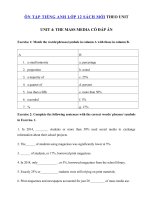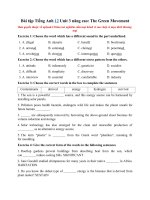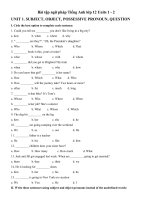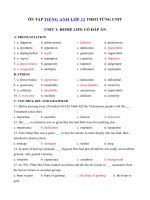Tải Bài tập Tiếng Anh lớp 12 Unit 14 INTERNATIONAL ORGANIZATIONS có đáp án (3) - Trắc nghiệm Tiếng Anh lớp 12 có đáp án
Bạn đang xem bản rút gọn của tài liệu. Xem và tải ngay bản đầy đủ của tài liệu tại đây (79.04 KB, 6 trang )
<span class='text_page_counter'>(1)</span><div class='page_container' data-page=1>
<b>Bài tập Tiếng Anh lớp 12 Unit 14 INTERNATIONAL ORGANIZATIONS</b>
<b>Choose the wordwhich is stressed differently from the rest.</b>
1. <b>a. disaster</b> b. prisoner c. agency d. family
2. a. international b. federation <b>c. society</b> d. dedication
3. a. catastrophe b. emergency c. conventional <b>d. vulnerable</b>
4. a. suffering b. president <b>c. protection</b> d. conference
5. a. involve b. propose c. improve <b>d. soldier</b>
<b>Choose a, b, c, or d that best completes each unfinished sentence, substitutes the underlined part, </b>
<b>or has a close meaning to the original one.</b>
6. All payments to the ICRC are _______ and are received as donations.
a. volunteer <b>b. voluntary</b> c. voluntarily d. voluntariness
7. The Red Cross organizes and leads relief assistance missions after ______, such as natural disasters,
man-made disasters, and epidemics.
a. emergent <b>b. emergencies</b> c. emergently d. emergence
8. One of the tasks of the Red Cross is also to support local _ care projects.
<b>a. health</b> b. healthy c. healthful d. healthily
9. The World Health Organization is the United Nations specialized agency for _______ health.
a. a b. an c. the <b>d. Ø</b>
10. The International Red Cross started over 135 years, inspired by _______ Swiss businessman, Jean
Henri Dunant.
<b>a. a</b> b. an c. the d. Ø
11. When was _______ United Nations established?
a. a b. an <b>c. the</b> d. Ø
12. One of the core tasks of the Red Cross is to organize nursing and _____ for those who are wounded
on the battlefield.
<b>a. care</b> b. attention c. victim d. catastrophe
13. The International Red Cross and Red Crescent _______ occurs once every four years.
a. Globe b. Society <b>c. Conference</b> d. Nations
14. The mission of the Red Cross is also to supervise the _______ of prisoners of war.
a. education b. encouragement <b>c. treatment</b> d. runaway
</div>
<span class='text_page_counter'>(2)</span><div class='page_container' data-page=2>
16. Henri Davison, president of the American Red Cross war Committee proposed forming a federation
of these National Societies.
a. took b. dedicated c. carried <b>d. suggested</b>
17. Fifty per cent of road accidents results in head injuries.
a. examines b. heals <b>c. causes</b> d. treats
18. Jean Henri Dunant was appalled by the almost complete lack of care for wounded soldiers.
a. dedicated <b>b. shocked</b> c. interested d. excited
19. The mission statement of the International Movement as formulated in the "Strategy 2010" document
of the Federation is to improve the lives of vulnerable people by mobilizing the power of humanity.
<b>a. weak and unprotected</b> b. wealthy and famous
c. poor and disabled d. deaf and mute
20. Did your son pass the university entrance examination?
a. make up b. get along c. go up <b>d. get through</b>
21. What may happen if John will not arrive in time?
a. go along b. count on c. keep away <b>d. turn up</b>
22. Johnny sometimes visits his grandparents in the countryside.
<b>a. calls on</b> b. keeps off c. takes in d. goes up
23. They decided to postpone their journey till the end of the month because of the epidemic.
a. take up b. turn round <b>c. put off</b> d. do with
24. The stranger came ___ me and asked, "Is there a post office near here?"
a. on to b. away from c. out of <b>d. up to</b>
25. Frankly speaking, your daughter does not take _______ you at all.
<b>a. after</b> b. along c. up d. over
26. She is not really friendly. She does not get on well ____ her classmates.
a. from <b>b. with</b> c. for d. to
27. I would be grateful if you kept the news _______ yourself. Do not tell anyone about it.
a. from <b>b. to</b> c. for d. at
28. I do not use those things any more. You can _______ them away.
a. get b. fall <b>c. throw</b> d. make
29. They were late for work because their car _______ down.
a. got b. put c. cut <b>d. broke</b>
</div>
<span class='text_page_counter'>(3)</span><div class='page_container' data-page=3>
<b>a. knocked</b> b. came c. went d. fell
<b>Choose the best that can complete the following.</b>
31. The Food and Agriculture Organization (FAO) _______ that leads international efforts to defeat
hunger.
a. it is a specialized agency in the United Nations
b. as it is a specialized agency by the United Nations
<b>c. is a specialized agency of the United Nations</b>
d. a specialized agency of the United Nations
32. _______, FAO acts as a neutral forum where all nations meet as equals to negotiate agreements and
debate policy.
<b>a. Serving both developed and developing countries</b>
b. Although it serves both developed and developing countries
c. Served both developed and developing countries
d. As it was served both developed ,and developing countries
33. FAO helps developing countries to improve agriculture, forestry and fishery practices, _______.
a. as though it ensures good nutrition and food security for all
b. but it ensures good nutrition and food security for all
c. for ensuring good nutrition and food security for all
<b>d. and ensure good nutrition and food security for all</b>
34. FAO was founded on 16 October, 1945 in Quebec, Canada, _______.
a. In 1951 when its headquarters were moved to Rome, Italy
b. Since its headquarters were moved to Rome, Italy, in 1951
<b>c. In 1951 its headquarters were moved to Rome, Italy</b>
d. Its headquarters moved in 1951 to Rome; Italy
35. _______, which meets every two years to review the work carried out by the organization and
approve a Program of Work and Budget for the next biennium.
</div>
<span class='text_page_counter'>(4)</span><div class='page_container' data-page=4>
The World Health Organization (WHO) is a specialized agency of the United Nations that acts as a
coordinating authority on international public health. Established on 7 April, 1948, and headquartered in
Geneva, Switzerland, the agency inherited the mandate and resources of its predecessor, the Health
Organization.
The WHO's constitution, states that its objective is "the attainment by all peoples of the highest
possible level of health." Its major task is to combat diseases, especially key infectious diseases, and to
promote the general health of the people of the world. The WHO also sponsors programs to prevent and
treat serious epidemics such as SARS, malaria, and AIDS. The WHO supports the development and
distribution of safe and effective vaccines, pharmaceutical diagnostics, and drugs. After over 2 decades
of fighting smallpox, the WHO declared in 1980 that the disease had been eradicated - the first disease in
history to be eliminated by human effort.
The WHO is nearing success in developing vaccines against malaria and aims to eradicate polio
within the next few years. The organization has already endorsed the world's first official HIV/AIDS
Tool kit for Zimbabwe making it an international standard. In addition to its work in eradicating disease,
the WHO also carries out various health-related campaigns, for example, to boost the consumption of
fruits and vegetables worldwide and to discourage tobacco use.
Experts met at the WHO headquarters in Geneva in February, 2007, and reported that their work on
pandemic influenza vaccine development had achieved encouraging progress. More than 40 clinic trials
have been completed or are ongoing. Most have focused on healthy adults. Some companies, after
completing safety analyses in adults, have initiated clinical trials in the elderly and in children. All
vaccines so far appear to be safe arid well-tolerated in all age groups tested.
36. The World Health Organization (WHO) _______.
<b>a. works on international public health</b>
b. has no relation to the United Nations
c. only takes care of Swiss people
d. has no predecessor
37. Which is not mentioned in the second paragraph 'as the tasks of the World Health Organization?
a. to promote the general health of everyone in the world
b. to support pharmaceutical diagnostics, and drugs
c. To combat diseases
<b>d. To supply food for patients.</b>
</div>
<span class='text_page_counter'>(5)</span><div class='page_container' data-page=5>
a. Malaria b. AIDS c. SARS <b>d. Smallpox</b>
39. According to the third paragraph, the World Health Organization ______.
<b>a. has not developed vaccines against malaria yet</b>
b. is trying to eradicate polio
c. is not concerned about polio
d. also carries out various health-related campaigns
40. Influenza vaccine _______.
a. has only been used for adults
b. cannot be used for children
<b>c. has appeared to be safe in all age groups tested</b>
d. causes bad effects on children and elderly people
<b>Fill in each numbered blank with one suitable word or phrase.</b>
Under the global "health for all" strategy, WHO (the World Health Organization) and its members
have placed special emphasis (41) _____ the developing countries. Nevertheless, the benefits of WHO's
international health work are benefited by all countries, including the most developed ones. For example,
all nations have benefited from their contributions to the WHO programs that led to the global (42)
_____ of smallpox and to better and cheaper ways of controlling tuberculosis.
(43) _____ is a key word in WHO's programs. The organization believes that immunization, (44)
_____ prevents the six major diseases of childhood-diphtheria, measles, poliomyelitis, tetanus,
tuberculosis, and whooping cough-should be (45) _____ to all children who need it. WHO is leading a
worldwide campaign to provide effective immunization for all children in (46) _____ with UNICEF.
Provision of safe drinking water for all is one of the objectives of the International Drinking Water
Supply and Sanitation Decade proclaimed by the UN General Assembly in 1980 and (47) _____ by
WHO. WHO is also active in international efforts to combat the diarrheal diseases, killers of infants and
young children. The widespread introduction of oral rehydration salts, together with improved drinking
water supply and sanitation will greatly reduce childhood mortality from diarrhea.
WHO's program for primary health (48) _____ comprises eight essential elements:
1.education concerning prevalent health problems and the methods of preventing and controlling
them;
2.promotion of food supply and proper nutrition;
</div>
<span class='text_page_counter'>(6)</span><div class='page_container' data-page=6>
5.immunization against the major (50) _____ diseases;
6.prevention and control of locally endemic diseases;
7.appropriate treatment of common diseases and injuries; and
8.provision of essential drugs.
These eight elements were defined in the Declaration of Alma-Ata, which emerged from the
International Conference, on Primary Health Care in 1978.
41.<b>a. on</b> b. in c. for d. with
42. a. campaign b. spread <b>c. eradication</b> d. epidemic
43. a. Prevent <b>b. Prevention</b> c. Preventable d. Prevented
44. a. whom b. whose c. that <b>d. which</b>
45. a. prepared b. concerned c. interested <b>d. available</b>
46. a. organization b. establishment <b>c. cooperation</b> d. protection
47.<b>a. supported</b> b. related c. treated d. attracted
48. a. attention <b>b. care</b> c. medicine d. danger
49. a. a <b>b. an</b> c. the d. Ø
</div>
<!--links-->









